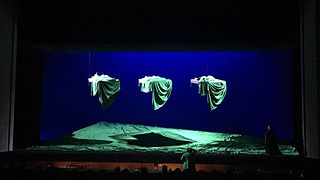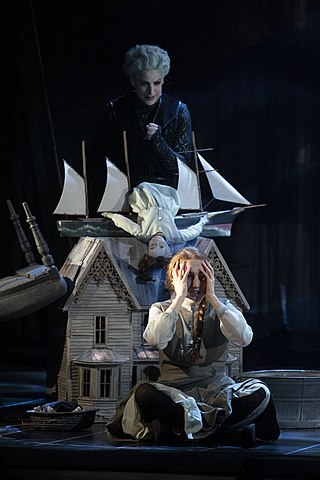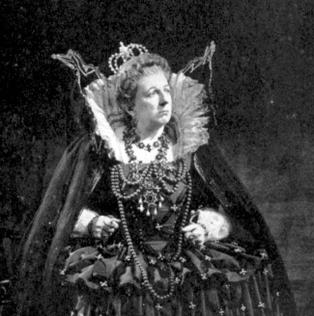
Sir Peter Neville Luard Pears was an English tenor. His career was closely associated with the composer Benjamin Britten, his personal and professional partner for nearly forty years.

Peter Grimes, Op. 33, is an opera in three acts by Benjamin Britten, with a libretto by Montagu Slater based on the section "Peter Grimes", in George Crabbe's long narrative poem The Borough. The "borough" of the opera is a fictional small town that bears some resemblance to Crabbe's – and later Britten's – home of Aldeburgh, Suffolk, on England's east coast.

Imogen Clare Holst was a British composer, arranger, conductor, teacher, musicologist, and festival administrator. The only child of the composer Gustav Holst, she is particularly known for her educational work at Dartington Hall in the 1940s, and for her 20 years as joint artistic director of the Aldeburgh Festival. In addition to composing music, she wrote composer biographies, much educational material, and several books on the life and works of her father.
Heather Mary Harper was a Northern Irish operatic soprano. She was active internationally in both opera and concert. She performed roles such as Helena in Benjamin Britten's A Midsummer Night's Dream at the Royal Opera House, Elsa in Wagner's Lohengrin at the Bayreuth Festival, and the Countess in Mozart's The Marriage of Figaro at the Metropolitan Opera. She became known internationally when she stepped in for the world premiere of Britten's War Requiem in 1962, and remained associated with the composer's work, but also sang other premieres.

A Midsummer Night's Dream, Op. 64, is an opera with music by Benjamin Britten and set to a libretto adapted by the composer and Peter Pears from William Shakespeare's play, A Midsummer Night's Dream. It was premiered on 11 June 1960 at the Aldeburgh Festival, conducted by the composer and with set and costume designs by Carl Toms. Stylistically, the work is typical of Britten, with a highly individual sound-world – not strikingly dissonant or atonal, but replete with subtly atmospheric harmonies and tone painting. The role of Oberon was composed for the countertenor Alfred Deller. Atypically for Britten, the opera did not include a leading role for his partner Pears, who instead was given the comic drag role of Flute/Thisbe.

Death in Venice, Op. 88, is an opera in two acts by Benjamin Britten, his last. The opera is based on Death in Venice, a novella by Thomas Mann. The opera's libretto is by Myfanwy Piper. Her husband John Piper designed the sets. It was first performed at Snape Maltings, near Aldeburgh, England, on 16 June 1973.

The Turn of the Screw is a 20th-century English chamber opera composed by Benjamin Britten, with a libretto by Myfanwy Piper, based on the 1898 novella The Turn of the Screw by Henry James.

The Delphic Hymns are two musical compositions from Ancient Greece, which survive in substantial fragments. They were long regarded as being dated c. 138 BC and 128 BC, respectively, but recent scholarship has shown it likely they were both written for performance at the Athenian Pythaids in 128 BC. If indeed it dates from ten years before the second, the First Delphic Hymn is the earliest unambiguous surviving example of notated music from anywhere in the Western world whose composer is known by name. Inscriptions indicate that the First Delphic Hymn was written by Athenaeus, son of Athenaeus, while Limenius is credited as the Second Delphic Hymn's composer.

Noye's Fludde is a one-act opera by the British composer Benjamin Britten, intended primarily for amateur performers, particularly children. First performed on 18 June 1958 at that year's Aldeburgh Festival, it is based on the 15th-century Chester "mystery" or "miracle" play which recounts the Old Testament story of Noah's Ark. Britten specified that the opera should be staged in churches or large halls, not in a theatre.
James Thomas Bowman was an English countertenor. His career spanned opera, oratorio, contemporary music and solo recitals. Arguably, he was, after Alfred Deller, the most important countertenor in the 20th century revival of the voice part. He combined early and baroque repertoires with contemporary work, becoming recognised for his portrayal of Oberon in Britten's A Midsummer Night's Dream and performing world premieres.

Mary Myfanwy Piper was a British art critic and opera librettist.

Joan Cross CBE was an English soprano, closely associated with the operas of Benjamin Britten. She also sang in the Italian and German operatic repertoires. She later became a musical administrator, taking on the direction of the Sadler's Wells Opera Company.

Sylvia Gwendoline Victoria Fisher was an Australian operatic soprano whose stage career was made in England, who was especially distinguished in German opera, and who created the role of Miss Wingrave in Benjamin Britten's Owen Wingrave in 1971. Fisher was made a Member of the Order of Australia in the 1994 Australia Day Honours, for "service to the arts, particularly opera".
Norma Burrowes is an Irish coloratura soprano, particularly associated with Handel and Mozart roles.
Marjorie Gwendolen Thomas was an English opera and oratorio singer for almost three decades. She sang at the Royal Opera House and was a regular performer at the Promenade Concerts and the Three Choirs Festivals and, for many years, a professor of singing at London's Royal Academy of Music. A favourite soloist of Sir Malcolm Sargent's, she also participated in a number of recordings of Gilbert and Sullivan operas.
Rae Woodland was a British soprano who studied with Roy Henderson. Her debut was as Queen of the Night at Sadlers Wells. She sang in many European festivals, and debuted at Covent Garden in La sonnambula with Joan Sutherland and Luciano Pavarotti. She was first asked to sing for Benjamin Britten on the English Opera Group's tour of Russia, and played many roles for him subsequently. She also created roles for Gottfried von Einem, Nicholas Maw and Sir Arthur Bliss, and made many live broadcasts for the BBC, from the RAH Proms to Friday Night is Music Night. She retired from the opera stage in 1984. She then taught singing at the Royal Academy of Music in London, and at the Britten-Pears School in Snape Maltings on the invitation of Sir Peter Pears.

Nancy Evans OBE was an English mezzo-soprano who had a notable career as a concert and opera singer. She is particularly associated with Benjamin Britten who wrote his song cycle, A Charm of Lullabies, and the role of Nancy in his opera Albert Herring for her.
John Noble was an English baritone. He was Ralph Vaughan Williams's favourite in the title role of the composer's opera The Pilgrim's Progress.

Anne Sharp was a Scottish coloratura soprano particularly associated with the operas of Benjamin Britten.

Hymn to St Peter is a cantata for treble soloist, SATB choir and organ composed by Benjamin Britten in 1955. The piece was the last Britten composed before he first travelled to Asia. He set the text from the gradual of the Feast of Saints Peter and Paul to music which was based on the plainsong of the Alleluia from the hymn. The piece starts with a sombre organ theme in B Flat and when the choir joins in it is initially in unison before breaking into harmonies. After a nimble interlude that recalls children's play, the piece returns to the original theme, ending with a coda played by the organ alone. The piece was first performed at the quincentenary celebrations of St Peter Mancroft, Norwich on 20 November 1955. It was subsequently performed by The Sixteen under Harry Christophers and has frequently been sung with children's voices.














